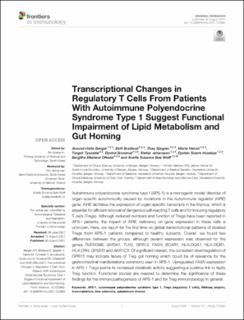| dc.contributor.author | Berger, Amund Holte | |
| dc.contributor.author | Bratland, Eirik | |
| dc.contributor.author | Sjøgren, Thea | |
| dc.contributor.author | Heimli, Marte | |
| dc.contributor.author | Tyssedal, Torgeir | |
| dc.contributor.author | Bruserud, Øyvind | |
| dc.contributor.author | Johansson, Stefan | |
| dc.contributor.author | Husebye, Eystein Sverre | |
| dc.contributor.author | Oftedal, Bergithe Eikeland | |
| dc.contributor.author | Wolff, Anette Susanne Bøe | |
| dc.date.accessioned | 2022-04-22T06:43:28Z | |
| dc.date.available | 2022-04-22T06:43:28Z | |
| dc.date.created | 2021-08-12T14:12:53Z | |
| dc.date.issued | 2021 | |
| dc.identifier.issn | 1664-3224 | |
| dc.identifier.uri | https://hdl.handle.net/11250/2992118 | |
| dc.description.abstract | Autoimmune polyendocrine syndrome type I (APS-1) is a monogenic model disorder of organ-specific autoimmunity caused by mutations in the Autoimmune regulator (AIRE) gene. AIRE facilitates the expression of organ-specific transcripts in the thymus, which is essential for efficient removal of dangerous self-reacting T cells and for inducing regulatory T cells (Tregs). Although reduced numbers and function of Tregs have been reported in APS-I patients, the impact of AIRE deficiency on gene expression in these cells is unknown. Here, we report for the first time on global transcriptional patterns of isolated Tregs from APS-1 patients compared to healthy subjects. Overall, we found few differences between the groups, although deviant expression was observed for the genes TMEM39B, SKIDA1, TLN2, GPR15, FASN, BCAR1, HLA-DQA1, HLA-DQB1, HLA-DRA, GPSM3 and AKR1C3. Of significant interest, the consistent downregulation of GPR15 may indicate failure of Treg gut homing which could be of relevance for the gastrointestinal manifestations commonly seen in APS-1. Upregulated FASN expression in APS-1 Tregs points to increased metabolic activity suggesting a putative link to faulty Treg function. Functional studies are needed to determine the significance of these findings for the immunopathogenesis of APS-1 and for Treg immunobiology in general. | en_US |
| dc.language.iso | eng | en_US |
| dc.publisher | Frontiers Media | en_US |
| dc.rights | Navngivelse 4.0 Internasjonal | * |
| dc.rights.uri | http://creativecommons.org/licenses/by/4.0/deed.no | * |
| dc.title | Transcriptional Changes in Regulatory T Cells From Patients With Autoimmune Polyendocrine Syndrome Type 1 Suggest Functional Impairment of Lipid Metabolism and Gut Homing | en_US |
| dc.type | Journal article | en_US |
| dc.type | Peer reviewed | en_US |
| dc.description.version | publishedVersion | en_US |
| dc.rights.holder | Copyright 2021 Berger, Bratland, Sjøgren, Heimli, Tyssedal, Bruserud, Johansson, Husebye, Oftedal and Wolff | en_US |
| dc.source.articlenumber | 722860 | en_US |
| cristin.ispublished | true | |
| cristin.fulltext | original | |
| cristin.qualitycode | 1 | |
| dc.identifier.doi | 10.3389/fimmu.2021.722860 | |
| dc.identifier.cristin | 1925633 | |
| dc.source.journal | Frontiers in Immunology | en_US |
| dc.relation.project | Stiftelsen Kristian Gerhard Jebsen: KGJ senter for autoimmune sykdommer | en_US |
| dc.relation.project | Helse Vest RHF: Helse | en_US |
| dc.relation.project | Notur/NorStore: NS9658S | en_US |
| dc.relation.project | Norges forskningsråd: 288022 | en_US |
| dc.relation.project | Norges forskningsråd: 262677 | en_US |
| dc.identifier.citation | Frontiers in Immunology. 2021, 12, 722860. | en_US |
| dc.source.volume | 12 | en_US |

